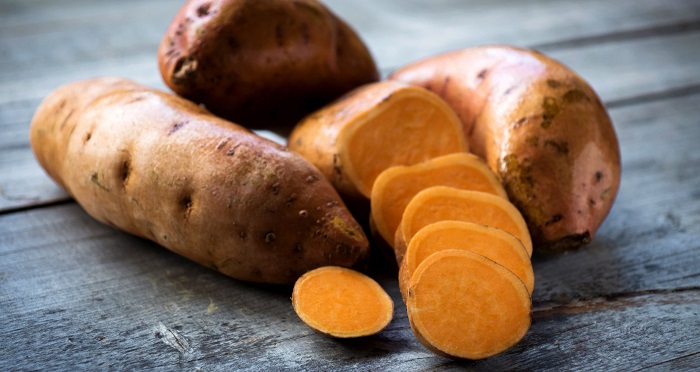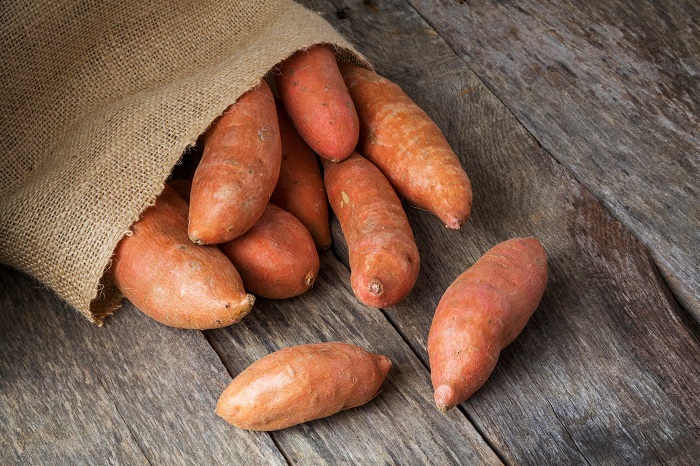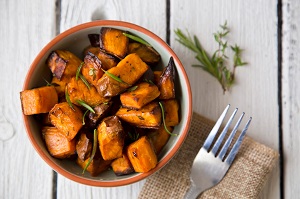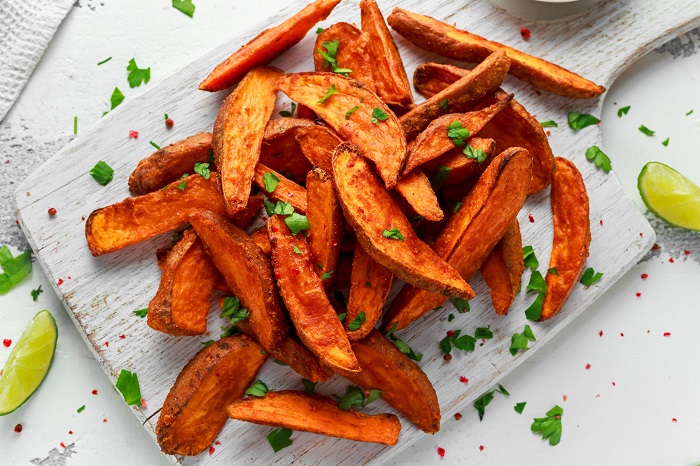
Story at-a-glance:
- Sweet potatoes are a favorite food. But are sweet potatoes good for you? And should you be eating them year-round? Here’s what you need to know about sweet potato nutrition, sweet potato health benefits, and more.
When I was growing up my parents didn’t feed us a lot of processed sugar. But once in a while, on a special occasion, we’d have sweet potatoes. When they were baking in the oven, it would fill our house with warmth, which was a special treat, especially in the winter, and the exquisite smell of sweet-potatoey goodness.
Clearly, I’m extremely fond of sweet potatoes. So when I decided to write an article about them, I had to check all my happy memories at the keyboard and look at the evidence.
Are sweet potatoes good for you? Are there any sweet potato health benefits? Where do they come from?
How can we prepare them, aside from in holiday casseroles and pies? And most confusing of all (to almost everyone), what’s the difference between sweet potatoes and yams?
Meet the Sweet Potato

Sweet potatoes (Ipomoea batatas) are large, starchy, sweet-tasting vegetables. They actually belong to the morning glory family.
Despite the shared name, sweet potatoes are only distantly related to the potatoes used to make French fries or potato chips. Non-sweet potatoes (including red, white, and Yukon gold varieties) are part of the edible nightshade family. Other members include tomatoes, tomatillos, eggplants, peppers, pimentos, and Goji berries.
Sweet potatoes are root tubers. Other root tubers include beets, carrots, parsnips, celeriac, and turnips. Root tubers store water and energy, like starch and other carbohydrates, underground. They draw upon these resources to feed the aboveground parts of the plant.
The Origin of the Sweet Potato
Sweet potatoes are some of the oldest foods known to humanity.
They are native to Central and South America. We have fossil evidence that sweet potatoes were growing in the Americas 35 million years ago. But very recently, scientists discovered 57-million-year-old leaf fossils in India that appear to be ancient morning glory leaves. This could beat the American claim as the point of origin of the sweet potato family by about 22 million years.
Wherever and whenever they originated, and however they have traveled the globe, I’m incredibly thankful that most of us have sweet potatoes in our lives today.
What’s the Difference Between a Sweet Potato and a Yam?
People often mistakenly refer to sweet potatoes as “yams.” But these two plants aren’t actually related at all.
Yams are related to grasses and lilies and native to Africa and Asia. They’re usually cylindrical with black or brown, rough, bark-like skin, and white, purple, or red flesh. Sweet potatoes have characteristic tapered ends with smoother skin.
You can find sweet potatoes at just about any grocery store. However, in North America and Europe, you will only find true yams stocked at international and specialty markets.
You might be thinking, “but I see yams at my grocery store all the time” — and you’d be right that they’re labeled that way. But this label is deceiving.
There are actually two types of sweet potatoes in most mainstream produce sections: firm and soft. Grocers needed a way to differentiate between the two types. The soft kind, which includes the Garnet and Jewel varieties, resemble yams. This is how they picked up the false name.
How Many Sweet Potato Varieties Exist?

While most supermarkets carry one or two different types of sweet potatoes, about 25 varieties are available in the United States. And I was amazed to discover that this represents only a tiny fraction of the total diversity of sweet potatoes.
The sweet potato geeks of the world may be fascinated to know that the International Potato Center in Peru maintains a gene bank consisting of over 6,500 varieties of sweet potato. I don’t know about you, but personally, I wish I could try them all!
Sweet potato varieties range in color from dark red to brown to purple to orange-yellow to white. They also have different tastes, sizes, shapes, and textures.
Here are Just a Few of the Most Popular Types of Sweet Potatoes:
- Garnet, Jewel, and Beauregard sweet potatoes have reddish-orange skin and deep orange flesh. These are often the ones masquerading as yams at mainstream grocery stores. Who knew sweet potatoes could be so sneaky?
- White sweet potatoes are crumbly, with white flesh and golden brown skin. They don’t contain as many antioxidants as orange varieties.
- Okinawan sweet potatoes are also known as purple sweet potatoes because of their high anthocyanin content. Anthocyanins are the pigments that give red, blue, and violet plant foods their beautiful colors. Anthocyanins are also what give Okinawan potatoes 150% more antioxidant power than blueberries. Despite their name, Okinawan potatoes are actually native to the Americas. They were brought over to Japan sometime in the 16th century, where they grow well and have become a staple in Japanese dishes. In North America, you will most likely find true purple sweet potatoes in an Asian supermarket.
- Japanese or Satsumaimo sweet potatoes are known for being sweeter than most other types. This is especially true when they start caramelizing in the oven.
Sweet potatoes are very hardy vegetables. They’re able to grow at many altitudes, in many climates, and under compromised soil conditions. Even if you don’t have the greenest of thumbs, sweet potatoes are pretty forgiving with just a little TLC.
What Makes a Sweet Potato Sweet?

Have you ever smelled a sweet potato caramelize in the oven or used them to make a pie or a cake?
If so, you know that even though they aren’t related to what we think of as potatoes, at least the “sweet” part of their name is entirely appropriate.
When you heat sweet potatoes, an enzyme starts breaking down their starch into a sugar called maltose. Maltose isn’t as sweet as table sugar. But it’s enough to satisfy a sweet tooth that hasn’t been entirely overwhelmed by M&M’s and Hershey’s Kisses.
You can control the sweetness of sweet potatoes somewhat by how you cook them. Cooking sweet potatoes quickly (for instance, by steaming them or cutting them into smaller pieces before roasting) can reduce their ultimate sweetness.
On the other hand, cooking sweet potatoes slowly on low heat will allow that maltose-making enzyme more time to convert the starch into sugar — giving you sweeter sweet potatoes.
Looking for even more control over the sweetness? The sweet potato enzyme is activated once they reach around 135°F and stops working at around 170°F. (That’s 57° to 77°C). So the more time they spend in that range, the sweeter they’ll be.
Are Sweet Potatoes Good for You?

The people of Okinawa, Japan have traditionally enjoyed one of the highest life expectancy’s in the world. I discovered this when my dad was researching his book Healthy at 100: The Scientifically Proven Secrets of the World’s Healthiest and Longest-Lived Peoples.
One of those secrets, it turns out, is lots and lots of sweet potatoes. The traditional Okinawan diet consists of minimal meat, dairy, eggs, and processed foods. Instead, they eat mostly whole plant foods. And they get a remarkable 60% of their calories from sweet potatoes alone.
It’s partly because of this high-fiber and antioxidant-rich dietary pattern that Okinawans enjoy such a long lifespan. Living to be one hundred years or older is not uncommon in Okinawa. Okinawans also experience less chronic disease than Americans do — with significantly fewer deaths from heart disease and cancers of the colon, breast, and prostate.
Traditional Papua New Guinea Highlanders have also been known to eat a lot of sweet potatoes. In fact, tubers like sweet potatoes and yams provide 90% of their calories!
They don’t eat much, if any, meat either. How has a sweet potato-based diet affected their health?
A study published in the Journal of Internal Medicine in 1994 found that, when these native groups still followed this traditional way of eating, they enjoyed lower blood pressure and weight than Westerners. And they almost never experienced heart disease, strokes, or other modern chronic diseases.
So are sweet potatoes good for you? Yes, they are!
What makes them so good for you?
Sweet Potato Nutrition
Sweet potatoes are high in fiber, vitamin C, potassium, pantothenic acid (vitamin B5), niacin (vitamin B3), vitamin B6, manganese, magnesium, and copper.
They get their orange color from beta-carotene, which is a pigment and antioxidant. Sweet potatoes also contain a modest but helpful amount of protein — around four grams per cup when cooked.
When compared to white potatoes, sweet potatoes offer more vitamins and antioxidants. Surprisingly, considering their sweeter taste, they also have a mildly lower glycemic index score. This makes them slower to digest.
But the greatest sweet potato nutritional glory of all may be its rich supply of vitamin A. A single sweet potato offers over double the daily value for vitamin A.
Sweet Potatoes Are Remarkably High in Vitamin A
Worldwide, vitamin A deficiency is the leading cause of preventable blindness in children. An estimated 250,000 to 500,000 children become blind every year due to a lack of this critical nutrient. Half of these children die within a year of losing their sight.
Hoping to solve this problem (and with perhaps a few other less noble motives in the mix), over the last several decades, biotechnology companies, governments, foundations, and scientists have spent hundreds of millions of dollars attempting to develop and popularize “golden rice.”
This is a form of rice that’s been genetically engineered to provide beta-carotene (a precursor to vitamin A). Despite decades of effort, the product still hasn’t reached the market.
How ironic that this same effort could have gotten sweet potatoes and the means to grow them into the hands of most of the impoverished families now suffering from vitamin A deficiency. Of course, that wouldn’t have made biotech company, Syngenta, any money. But it would have helped a whole lot more people than golden rice ever has, and most likely, ever will.
News flash: The biotech industry and its supporters have long promoted GMO golden rice as an urgently needed solution to vitamin A deficiency. But in late 2018, in a surprising twist, the US Food and Drug Administration (FDA) concluded its consultation process on golden rice by informing the current developers, the International Rice Research Institute (IRRI), that golden rice does not meet the nutritional requirements to make a health claim.
In effect, the FDA was saying that GMO golden rice offers no meaningful nutritional benefits.
Which again raises the question: How much better off would people be if the hundreds of millions of dollars spent on developing golden rice had instead been used to support the growth of sweet potatoes, carrots, and other vitamin A-rich vegetables in parts of the world where vitamin A deficiencies are a problem?
10 Incredible Sweet Potato Health Benefits
The unique nutritional profile of sweet potatoes makes them powerful allies in preventing disease and supporting overall health.
Here are some health benefits of adding sweet potatoes to your diet.
Sweet Potato Health Benefit #1: They Support Digestive Health
Sweet potatoes are an excellent source of fiber, especially when you eat the skin. Fiber is important for your digestive health, preventing constipation and serious diseases, such as colon cancer.
One medium sweet potato has six grams of dietary fiber. They also contain resistant starch, a type of starch that plays a role in feeding your body’s “good” bacteria.
Sweet Potato Health Benefit #2: They Keep Your Heart Healthy
The high fiber content of sweet potatoes can lower LDL (bad) cholesterol levels, helping to prevent cardiovascular disease.
Sweet potatoes are also high in potassium, which works in balance with sodium in your body to maintain healthy blood pressure.
They’re also high in copper, an essential metal for making red blood cells and keeping your heart healthy. Low levels of copper have been linked to dangerously high homocysteine, blood pressure, and LDL cholesterol levels.
Sweet Potato Health Benefit #3: They Help Stabilize Blood Sugar
The fiber and complex carbohydrates in sweet potatoes can help keep your blood sugar stable. And it can help you feel full longer. Sweet potato varieties also contain other substances that benefit stable blood sugar.
A 2004 study published in Diabetes Care successfully used Caiapo, an extract from white sweet potatoes, to naturally reduce and manage blood glucose in people with type 2 diabetes.
The 30 participants who were given 4 grams of Caiapo every day for 12 weeks saw a decrease in their HbA(1c) (going from 7.21 to 6.68), fasting blood glucose (143.7 vs. 128.5), and two-hour blood glucose (193.3 vs.162.8). The 31 participants who were given a placebo instead saw no such results.
Sweet Potato Health Benefit #4: They Can Boost Your Immunity
Sweet potatoes are rich in antioxidants that prevent free radical damage in your body.
One cup of baked sweet potato contains 52% of your daily value for vitamin C, which is important for wound healing and tissue repair.
And the vitamin A in sweet potatoes helps your body make immune cells that stave off infections and disease and have anti-tumor effects. Purple sweet potatoes contain especially potent antioxidants.
Sweet Potato Health Benefit #5: They Are Good for Your Eyes
Sweet potatoes contain several nutrients that have been linked to improved eye health and vision. Some of the most powerful are the carotenoids. They include alpha-carotene, beta-carotene, lutein, and zeaxanthin.
Beta-carotene, when taken as a supplement in isolation from the other carotenoids, can cause imbalances. But when eaten in foods, where it is always accompanied by, and in balance with, an entire suite of carotenoids, it’s been shown to have powerful anti-cancer and vision-enhancing properties.
Orange sweet potatoes (as well as other orange plants, including carrots) have particularly high concentrations of carotenoids.
It’s not just the orange sweet potatoes that are good for your vision, though. A class of anthocyanins called PSPA, derived from purple sweet potato roots, might also benefit your eyes.
A study published in Food & Nutrition Research in 2015 looked at whether PSPA could influence the health and growth of human retinal pigment epithelial (RPE) cells.
Why does this matter? The RPE is responsible for helping your eyes absorb light. It also directs immune response when faced with a threat to eye health. The researchers found that PSPA promoted DNA synthesis and healthy RPE cell growth and survival. They concluded that PSPA could potentially find use as a supplement for maintaining healthy vision.
Sweet Potato Health Benefit #6: They Fuel Your Brain
Sweet potatoes also contain compounds that help your brain function at its best, including choline and manganese.
Choline is an essential nutrient for brain growth and development, as well as the synthesis of the neurotransmitter acetylcholine that sends messages between cells.
Manganese is also important for brain health. It binds to neurotransmitters and helps move electrical impulses through your body faster. You can find 43% of your daily value of manganese in one cup of baked sweet potato.
The anthocyanins unique to purple sweet potatoes may also have memory-enhancing properties.
Sweet Potato Health Benefit #7: They Can Help Ease Stress and Anxiety
Sweet potatoes may help you relax. They’re high in magnesium, which has been shown to play a role in calming the brain. Magnesium deficiency has been linked to depression, mood disturbances, and headaches.
Other good sources of magnesium include avocados, legumes, tofu, nuts, seeds, and leafy greens.
(I’m dreaming right now of a loaded baked sweet potato piled high with a soft nut cheeze, avocado, a drizzle of flax oil, and a sprinkle of seasoning. It’s also accompanied by some freshly steamed and piping hot leafy greens for a delicious, magnesium-rich meal.)
Sweet Potato Health Benefit #8: They Can Help Boost Fertility
Vitamin A is an essential nutrient for healthy reproduction. And as we know, sweet potatoes are a fantastic source.
Sweet potatoes also offer a rich supply of iron, which has also been shown to be important in supporting fertility.
Sweet Potato Health Benefit #9: They Can Help Fight Cancer
Sweet potatoes are a rich source of cancer-fighting antioxidants, especially in their skin. They have other anti-cancer properties, too.
Up to 80% of the protein in sweet potatoes is a type of storage protein known as sporamin. This unique protein has been studied for anti-cancer ability and found to be effective in several disease types.
Research has been promising in the use of sporamin to inhibit tongue, gallbladder, and colorectal cancers. It has also been shown capable of slowing cancer cell growth and reducing cell migration and invasion in metastatic cancers.
Sweet potato peels, particularly those of the purple varieties, may be especially powerful when it comes to cancer prevention.
A study published in Nutrition and Cancer in 2016 looked at the antioxidant and anti-cancer effects of an extract from sweet potato peels. They found promising anti-cancer activity for cancers of the breast, colon, ovary, lung, and head/neck.
Sweet Potato Health Benefit #10: They Have Anti-Inflammatory Effects
Eating sweet potatoes may also help reduce inflammation.
This is chiefly due to their high levels of beta-carotene, vitamin C, and magnesium. Their abundance of antioxidants doesn’t hurt here, either.
One of the particular antioxidants that’s found most abundantly in purple sweet potato flesh is cyanidin. Cyanidin has been linked to reducing inflammation, especially in the digestive tract.
How to Choose and Store Sweet Potatoes
Next time you shop for sweet potatoes, here are a few things to keep in mind.
When you pick one up, take a close look at its skin (no, you don’t have to pack your magnifying glass). It should all be mostly the same color without visible signs of decay or cracking.
Give it a little squeeze. You don’t want your sweet potato to be squishy anywhere, as this could indicate rotting.
When you get your sweet potatoes home, make them a nice place to rest in a basket on your countertop or pantry. You should keep them dry and cool (room temperature, not refrigerated).
Typically, you should use sweet potatoes within a few weeks of purchase.
The Best Way to Prepare Sweet Potatoes

Maybe you eat sweet potatoes regularly. Or maybe you only think of them as a seasonal side dish.
Me? I’ve enjoyed a baked sweet potato for breakfast with a delicious organic tofu chive spread on it. Or for lunch with salad dressing or a peanut curry sauce. Or as a base for dinner, or even dessert.
I haven’t tried a steamed sweet potato smoothie (although, come to think of it, maybe I should!). Sweet potatoes are delicious, incredibly versatile, and you can eat them in more ways than you think.
You can prepare them by boiling, steaming, baking, stir-frying, grilling, or cooking and mashing.
But the bottom line is: You just might want to cook sweet potatoes in whatever makes you most likely to eat — and enjoy them.
The only way I’d recommend not preparing sweet potatoes is by deep-frying them. This isn’t the healthiest way to cook food anyway. But for sweet potatoes, it can actually lead to the creation of acrylamide — a potential carcinogen.
If it works well with your recipe, try leaving the skin on for some potent fiber and nutrients. Sweet potato skin is also full of antioxidants. In fact, sweet potato skin may have over 10 times the antioxidant power of the flesh inside.
Including a few grams of fat in your sweet potato recipes can significantly increase the amount of beta-carotene your body absorbs from the meal. Just use a small amount of nut butter, avocado, olive oil (if you use oil), or have a fat source in the same meal.
Can You Eat Sweet Potatoes Raw?
Regular raw potatoes, especially green ones, can contain the toxic enzyme solanine, so they shouldn’t be eaten raw. Sweet potatoes can be consumed without cooking them; however, they might cause some digestive issues.
If you do decide to try them — maybe grated in a smoothie or salad — you may not want to eat too many raw sweet potatoes because they have an enzyme inhibitor that makes it harder for your body to digest protein and can make digestion difficult when consumed in large quantities. (Cooking destroys this protein inhibitor.)
Bloating, cramps, and gas could be possible when eating raw sweet potatoes. They might also make you fart because they contain raffinose, one of the sugars responsible for flatulence.
5 Healthy Sweet Potato Recipes

My mouth is watering as I think about all the ways you can prepare sweet potatoes.
Check out some of these healthy recipes if you want some delicious ideas.
Oil-Free Baked Sweet Potato Fries from the Conscious Eater
These healthy, seasoned, oil-free fries take little time to prepare and could pair well with just about any meal.
Sweet Potato Casserole with Herbed Mushroom Stuffing from Forks Over Knives
Sweet potatoes provide the base of this filling, nutrient-packed casserole layered with mushrooms, onions, cranberries, and savory herbs.
Berry-Stuffed Breakfast Sweet Potato from Forks Over Knives
Sweet potatoes may not be a traditional breakfast, but this hearty recipe will have you starting your day with a slew of antioxidants and a nice, warm belly.
Sweet Potato Coconut Curry Soup from Minimalist Baker
Here’s a sweet and creamy soup with a little bit of spice and fewer than 10 ingredients.
Healthy Sweet Potato Pie from Chocolate Covered Katie
You don’t only have to reserve your sweet potato pie consumption for the holidays. Enjoy this flavorful, filling, healthier dessert any time of year.
Sweeten Your Health with Sweet Potatoes
Fiber, complex carbohydrates, vitamins, and minerals are essential for good health. And sweet potatoes are a fantastic way to add them to your diet.
Many of us have ancestors who reaped their benefits for a very long time, and there’s certainly no need to stop now. Luckily, sweet potatoes are affordable, easy to use and store, and available in many parts of the world all year long.
Sounds pretty sweet to me!
- Special Thanks to Ocean Robbins and Food Revolution Network for much of the contents supplied in this article.
Tell us in the comments:
- Did any of the sweet potato health benefits surprise you?
- Will you eat more sweet potatoes now?
- What’s your favorite way to enjoy sweet potatoes?

Whoah, this weblog is fantastic. I love reading your articles. Keep up the great work! You understand, lots of individuals are hunting round for
this info, you could aid them greatly.
Kudos on this great article!!!
Hey, I am so excited I found your blog page, I really found you by accident, while I was researching on Bing for something else. Anyhow, I am here now and would just like to say cheers for a fantastic post and a all round interesting blog (I also love the theme/design), I don’t have time to read it all at the minute but I have book-marked it and also included your RSS feeds, so when I have time I will be back to read a lot more, Please keep up the fantastic job.
You’re really an outstanding webmaster. The website loading speed is incredible. It seems like you’re doing an distinctive trick. Furthermore, The contents are masterpiece. You have performed a excellent task on this subject! Thanks
I have been surfing on-line more than 3 hours, but I never discovered any fascinating article like yours. It’s pretty worth enough for me. Personally, if all site owners and bloggers made
excellent content as you did, the net would be a lot more useful than ever
before.
Thank you for the good write-up. It in fact was an amusing account of it.
What’s up to every body, it’s my first go to see of this web site; this webpage contains amazing and in fact good stuff in favor of readers.
After looking at a handful of the blog posts on your web page, I truly like your technique of blogging. I book marked it to my bookmark site list and will be checking back in the near future. Take a look at my website as well and tell me what you think.
Hey there! This is my first visit to your blog! We are a group of volunteers and starting a new project in a community in the same niche. Your blog provided us valuable information to work on. You have done a wonderful job!
You could certainly see your expertise in the articles you write. The sector hopes for even more passionate writers like you who are not afraid to mention how they believe. Always go after your heart.
Hello there! This is my first visit to your blog! We are a group of volunteers and starting a new initiative in a
community in the same niche. Your blog provided us useful information to work on. You have done a outstanding job!
Hi, I am trying to to find things to enhance my website! I assume its okay to use some of your ideas!!!
Greetings! This is my first comment, so I just wanted to give a quick shout out and say I truly enjoy reading your blog posts.
Can you recommend any other blogs/websites/forums that cover the same topics? Thank you!
Very good article. I certainly love this site. Stick with it!
Excellent website. A lot of helpful information here. I am sending it to some friends ans additionally sharing in delicious. And naturally, thank you to your effort!
Thank you for the good write-up. It in fact was a amusement account it. Look advanced to more added agreeable from you!
Hi, I want to subscribe to this webpage to obtain newest updates…
Hi, I’m trying to find things to enhance my site! I guess its good enough to use a few of your ideas!!!
I have read so many articles or reviews regarding the blogger lovers but this piece of writing is in fact a good post, keep it up.
You actually make it appear really easy with your presentation. It sort of feels too complex and extremely broad for me. I am looking ahead for your subsequent post, I will attempt to get the hang of it!
Very rapidly this web site will be famous amid all blog viewers, due to it’s fastidious articles…
Thanks I love plant and crop based diet. I learned to grow my own vegetable fruit and crop garden and it feels really good. Wouldn’t it be great if you could just get fresh, tasty vegetables from your own backyard whenever you need it? From saving our environment to helping burn calories and making your body healthy, growing a vegetable garden comes with lots of benefits.
This mindbodyhealth.com article “Sweet Potato Health Benefits” has helped me, plus it is very well written. I’m glad I found it. Thanks
Hi, I found https://www.mindbodyhealth.com very useful. The “Sweet Potato Health Benefits” post is well written and has helped me a lot. I now feel beautiful and attractive. 🙂 I am so happy!!!
Hi, the Sweet Potato Health Benefits is very good, congratulations to the mindbodyhealth.com authors. I found a product that changed my life. Love yourself and be happy! 🙂 Kisses!
You have got to see this…
Like!! I frequently read blogs and I really thank you for your content. The article has truly peaked my interest.
I have read a some good stuff here. Certainly worth bookmarking for revisiting. I wonder how much effort you put to create such a magnificent informative website.
Hi, just wanted you to know I added your site to my Google bookmarks due to your layout. But seriously, I believe your internet site has one (1) of the freshest theme I have come across. It really helped make reading your blog significantly easier.
You are a very clever individual!
Hello there, I found your web site via Google while searching for a related topic, your site came up, it appears good. I’ve bookmarked it in my google bookmarks.
An impressive post, So let me reword that: Thnx for the treat! But yeah Thnkx for spending the time to post this, I really feel strongly about it and love studying more on this topic. Big thumb up for this blog!
I think this is among the most significant information for me. I’m enjoyed reading your article. But want to remark on some general things, The
web site style is perfect, the articles is really excellent. Good job, cheers
I have seen a lot of website but I believe this one has got something extra. Thanks
Great topic. Thank you for this post.
Thanks for this blog, nice to read. Do not stop.
Superb blog. – Cheers!